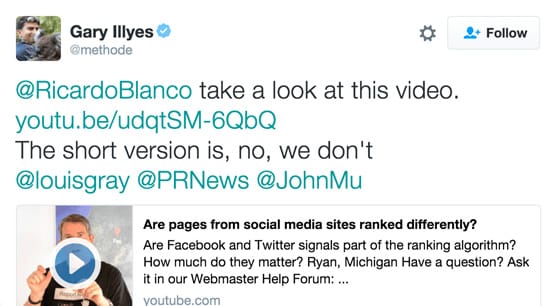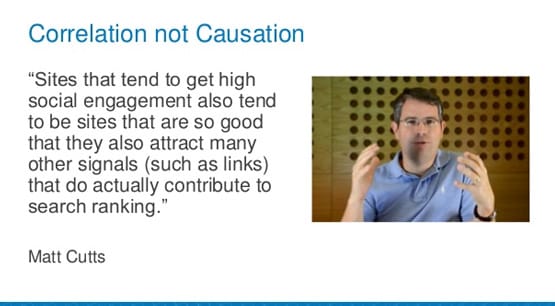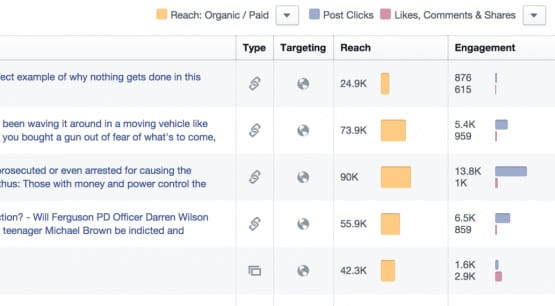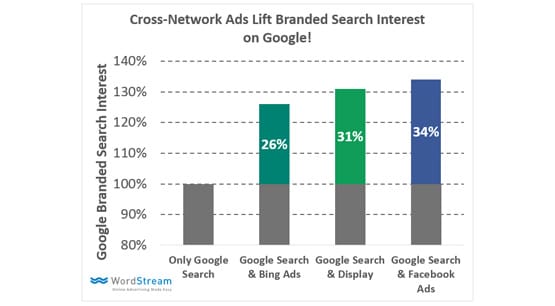Does Social Media Engagement Affect Your SEO and Rankings?
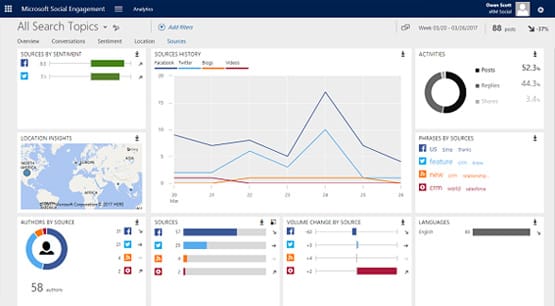
Few will disagree that social media matters for business. There are numerous examples of businesses that would fail entirely without some well-timed posts on Reddit or Twitter, and of course every business can see the growth they gain by using social media themselves.
The question at issue is not whether or not social media engagement affects your business, it’s how. Is social media a ranking factor? Does Google use it in some way? Let’s look at the evidence.
Social Media as a Ranking Signal
All the way back in 2010, when social media was about eight years younger, people were debating this exact same question. Danny Sullivan, talking with Google via email, learned that Google does indeed use links shared on social media as a kind of ranking signal. Matt Cutts later confirmed it in a video; Google does – or did at the time – use links from social media sites as a ranking signal.
A few years later, in 2014, Google clarified; they pay attention to links on Facebook and Twitter, like any other website, but they are not specifically their own ranking factor. A link on Facebook is the same as a link on some random blog, more or less. They don’t fall into different categories.
In 2016, Gary Illyes was asked about the same issue, and said the short version is that Google does not take social into account.
A study performed by SearchMetrics found an extreme correlation between social signals and search ranking position. That is, however, just that; correlation. As we all know, correlation does not equal causation. It could just as easily be that highly ranked pages accumulate more social interactions, and that those social interactions have no impact on search ranking on their own.
Links Vs Engagement
The issue we run into here is the difference between links on social media, and social media engagement. Links are one thing; they’re known to be one of Google’s central ranking factors since their inception.
How much links from social networks matter is another thing entirely. In some cases, it seems links are treated as nofollow, largely because they actually are nofollow. It’s rare these days that a social media link is actually followed, to avoid spam issues. Google, of course, can still see, index, and count them if they so desire.
Links play directly into shares, as well. It’s a question Google needs to answer; when a post is shared, is the new iteration of the post the same link, or a new link? Generally, from what I’ve read of what Google has said over the years, I believe they count as one link in summation. A post with 1,000 shares and a post with 0 shares both count as, effectively, one link at whatever base value Google uses to rate a social link.
Other forms of engagement, though, are different. They don’t tie into link juice; they would have to be another ranking factor entirely, which Google has said they aren’t.
Likes, comments, retweets; these kinds of social engagement are always higher on posts that link to websites with high search ranking. The question becomes; do these elements of social engagement affect SEO?
Direct and Indirect
Directly, social media engagement does not affect SEO for the post it links to. Can you imagine if it did? If I could make a post on Facebook, get 10,000 likes, and have the linked post shoot to the top of Google’s search results, you can bet I’d be pushing extremely hard to replicate that every chance I could get.
So would everyone else, and, well, you know how social networks are. They have an incredibly huge problem with bots pushing fake engagement to sculpt what users see. It ranges from small businesses buying followers to look bigger and ward off predators, to the Russian Propaganda Machine influencing global politics with fake users.
Correlation is not causation; social media engagement does not directly impact search ranking. It does, however, have indirect impact.
First of all, widely-shared posts on social media have the potential to bring you more links. I don’t mean links from Facebook, or Twitter, or whatever other site; those aren’t any more valuable when you get more engagement. What I mean is from the readers.
You’re striving to build a relevant audience, and a lot of the people in your audience have their own websites. If even one out of every hundred who share your post decides to link to it on their website, that’s value. The more shares you get, the more exposure you get to a broader audience. The more exposure you get, the more people are going to find your content relevant to something they’re writing, and will link to it. Every link is a benefit in this context.
This, as with many aspects of building value through social media engagement, relies on you having a genuine audience. The more fake, bot, or bad followers you have, the lower your engagement rates. It doesn’t matter what the displayed number on your profile happens to be; subtract all the fakes to find your real audience.
Social media engagement also helps bring your message, your link, and your brand to a broader audience. Facebook is the clearest example of this; when you like a post or leave a comment on it, many of your friends will see it even if they don’t follow the brand itself. It’s activity your friends may want to keep up with, so they’re given the opportunity to engage as well.
This cascades. Every new piece of engagement, even if it’s not a share, sends your post to more people; the engaged friends of the original person to comment, like, or otherwise engage. On Facebook, it’s even shown as a separate form of reach in your analytics; viral reach.
You can take advantage of this by encouraging users to engage with your posts. You can do anything from the obvious asking them to share or comment directly, to making semi-clickbait people love engaging with. How many times have you see something posted with a provocative question you just need to answer? Those kinds of posts are engineered specifically to get you and people like you to comment, spurring conversation, building affinity with the brand, and getting more exposure out of the deal.
Brand awareness is, of course, additionally valuable. The more your brand is exposed to an audience, the more people start to recognize you. If they haven’t read anything predominantly good or bad about you, but they know enough to know your industry, that’s a good position to be in. If a person needs a printer, and they know Brother is a brand they haven’t heard anything really bad about, they’ll be more inclined to trust the brand and buy their products. This is irrespective of whether or not the brand actually has good reviews for that given product; the familiarity is important enough.
Brand awareness leads to branded searches as well. When a user recognizes your brand name, they can search for your products with the brand attached; they’re already starting from a position of familiarity. Rather than searching for printers in general and starting from scratch, they start from a position of “Brother is good; let’s start there and see if anything turns us away.”
Branded searches are good, because they’re already more intent on finding you than the average generalist search. This means they have a lower bounce rate and a higher rate of clicking through, as well as better actions while on the site. All of these are Google ranking factors, and will give you some benefit, even if it’s minimal.
On top of all of that, people commenting on your social media posts can be extremely beneficial to you as a brand. Here are a few potential occurrences:
- Customers responding to questions will routinely give you ideas for how you can continue to engage with them in the future.
- Customers can leave comments relating to customer service issues they may be having, and others will chime in to concur; this can bring issues to your attention that you otherwise might not have known about, or thought were more localized than they were.
- Customers can leave positive reviews in comments, which can be used as testimonials on your website, as well as encouraging other users on social media to trust your brand.
- Customers can answer questions in such a way as to reveal pain points with your website, with your products, or with their lives in general. All of these are avenues you can use to improve your offerings and grow your conversions and your business.
You can even have customers who are invested in your brand taking up a sort of customer service role, answering questions as a community well enough you don’t need to step in.
Taking Steps
So, the conclusion you can draw here is that, while Google claims not to use social signals as part of search engine ranking, social signals and engagement definitely help. Either Google is lying to help prevent massive social media fraud, or they’re not lying and social signals only help through indirect means.
Either way, if social signals are beneficial, why not build them? The worst you could do is gain some benefit to your site indirectly, and I’d say that’s a pretty good worst case scenario.
The first thing you should do is look at your current marketing plan and compare it to the lists of common important search ranking signals. Are you working on publishing high quality content on a regular schedule? Are you providing good customer service? Is your site easy to use? Are you reaching out to earn good backlinks?
All of these are elements of SEO that I would consider more important than social media. Once you’ve established good marketing practices in these areas, you can start to invest in social media.
As for how to build and grow your social media presence, here are some tips.
- Focus on building an audience. The more people you have following you, the more raw engagement you’re going to get. Just make sure you’re not using exploitative techniques that will end up filling your audience with fake accounts; those won’t do you any good, directly or indirectly.
- Limit yourself to only a couple social profiles at a time. If you go into it thinking you’ll make a Facebook account, Twitter profile, LinkedIn page, Instagram profile, Pinterest board, and Google+ page all at once, you’ll quickly find yourself overwhelmed. Automation can help with this but it’s still better to take things slow at first.
- Make sure you’re posting regularly. Daily posts are a minimum for just about everyone on social media; only huge brands like Nike can get away with posting infrequently and still benefit from the network.
- Make sure you’re posting the right kinds of content. Avoid overtly advertorial or commercial posting. Instead, focus on value and interaction with your audience. Post content they can make use of, they can relate to, or they can use as a venue to share their own experiences.
- Respond to engagement when relevant to do so. Making sure you’re an active part of your community makes users feel more willing to speak up, as they know you’ll read and even respond to their comments. It also makes your posts look more active with a bunch more comments.
It’s not all that difficult to establish a social media presence, but building one that’s capable of benefitting a website is trickier. You need to focus on growth above all else; small audiences simply won’t cut it. Thankfully, there are a lot of resources on this blog and others that can help.




